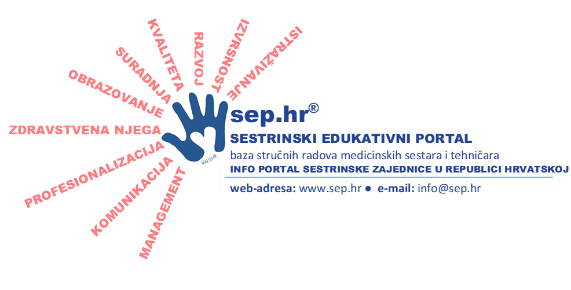Autori: Alketa-Theodora Spyrou
Ustanova zaposlenja: GREECE
Ključne riječi: myocardial infarction, risk factors, level of patients’ knowledge, quality of life
Kongres/Simpozij: ”5. Međunarodni kongres HDMSARIST-a” i ”8. Međunarodni kongres WFCCN-a”
Mjesto i vrijeme održavanja: Šibenik, 12.-15. travnja 2012. godine
Introduction: The patients’ outcome after an Acute Myocardial Infarction (AMI) has been associated with various demographic and socioeconomic factors such as the educational level, income and profession which is the most significant ones.
The aim of this study was the investigation of patients’ knowledge after an AMI about the clinical signs and symptoms as well as the risk factors of Coronary Heart Disease (CHD).
Material and Methods: The study population comprised of 104 patients (80 males and 24 females) who were admitted through the emergency department and hospitalized for ΑΜΙ to a Specialized Cardiac Hospital of Athens from 2007 to 2009. Data were collected through a telephone interview with the patients, using a questionnaire which included 46 questions. 15 of them referred to patients’ demographic characteristics and the 20 referred to their knowledge on AMI signs and symptoms and 11 referred to the change of lifestyle. Answers were categorized as “right” or “false”.
Results: The questionnaire’s Cronbach’s alpha was 0.688. There were statistically significant correlations between some of the demographic factors and the patients’ knowledge in some of the questions. A statistically significant correlation was found between patients’ educational level (p<0.000), age (p<0.000) and knowledge about opioids, thrombolysis, contraindications of aspirin, anticoagulation therapy, β-blockers, and some of the risk factors predisposing to Acute Myocardial Infarction. Furthermore, there was statistically significant correlation between patients’ sex (p<0.000) and their knowledge about the side effects of analgesics, anticoagulation therapy, nicotine substitutes and the time required to answer which was their physician’s telephone number.
Conclusions: Either the policy of the Hospital is the training of patients individually before their discharge; the results of the study suggest the necessity of individualized training interventions related to patient’s sex, age, and educational level. It is very important for the medical/nursing staff to provide a follow up feedback to the patients’ knowledge before discharge and at least two months post-discharge.
